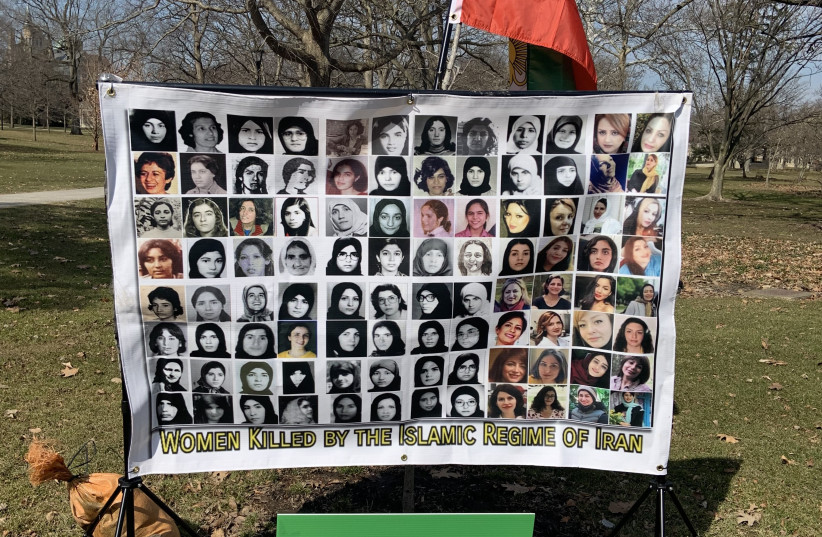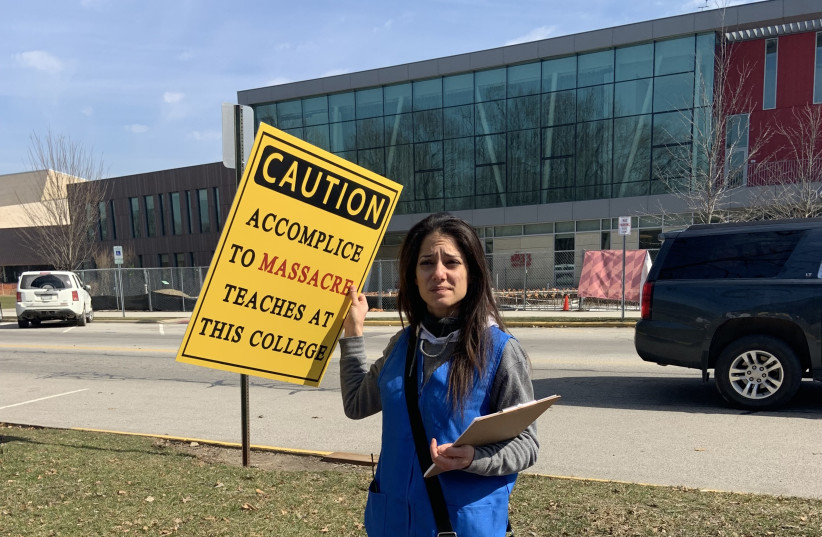Iranian-Americans, college students and community members assembled in the town of Oberlin, Ohio on Saturday to protest against the gender apartheid policies of the Islamic Republic of Iran and the alleged role of an Oberlin College professor in the cover-up of a massacre of 5,000 Iranians in 1988.
“Celebrating 43 Years of Iranian Women[‘s] Resistance Against the Gender Apartheid Islamic Regime of Iran,” read one sign held by Lawdan Bazargan, the lead organizer of the demonstration.
The demonstration was held ahead of International Women’s Day, marked on March 8.
Bazargan told The Jerusalem Post about the dire plight of a number of incarcerated Iranian women spotlighted at the protest.

She cited the case of “Maryam Akbari Monfared, who was born in 1975, and three of her brothers and a sister were executed in the 1980s or in the 1988 massacre.
As an adult woman, when she demanded an answer about why they were executed, she was put in jail. She was arrested in 2009 and was sentenced to 15 years. Her children grew up without her.”
A second case involves “ Saba Kord Afshari, a 20-year-old girl who protested against compulsory [wearing of the] hijab, who was sentenced to 27 years in jail on the charges of ‘promoting corruption and prostitution through appearing without a headscarf in public,’ and on the charge of ‘propaganda against the state,’ and on the charge of ‘assembly and collusion with an intent to commit a crime against national security.’
Later Afshari's mother was arrested too because she spoke up demanding her daughter's release,” Bazargan said.
The activists want Oberlin College President Carmen Ambar to fire Mohammad Jafar Mahallati, a professor of religion and Tehran’s former ambassador to the UN, for his reported role in the mass murder of Iranian dissidents.

According to a 2018 Amnesty International report, Mahallati engaged, as Iran’s ambassador to the UN, in “crimes against humanity” by aiding the clerical regime in the killing spree conducted throughout the state’s prisons.
Thousands of male and female prisoners were summarily slaughtered during the summer of 1988.
Bazargan said at the protest that Mahallati should not be allowed to “teach ethics and peace” due to the grave allegation of “crimes against humanity” leveled against him.
“We want justice and accountability,” she said, adding that new research showed that Mahallati declared, in a 1981 interview, that the persecuted Bahaʼi religion should not exist.
Bazargan, whose brother Bijan was murdered by the Iranian regime in 1988 for his leftist views, announced, in a statement directed to Ambar: “Rest assured, we are coming back in June for the graduation” ceremony at the college.
Roughly 75 Iranian-Americans and human rights activists protested against Mahallati in November. The activities against Mahallati have morphed into a global campaign that has unified the entire spectrum of Iranian dissident organizations and parties. A group of 15 people showed up on Saturday.
Iranian-Americans are outraged at Ambar’s refusal to meet with the families of the 1988 victims. Post interviews with the protesters and activists involved in the campaign against Mahallati revealed a consensus among Iranian-Americans that the Oberlin College administration and its board of trustees do not value Iranian lives.
Mahallati denied that he committed crimes against humanity, in a statement to the Post in October 2020
Oberlin College spokesman Scott Wargo sent the Post a fact sheet about Mahallati that appears on the school’s website. He added that “The college doesn’t have any further comment.” The Post previously reported on the fact sheet.
“Caution: Accomplice to Massacre Teaches at this College,” a sign held by Marjan Ghadrdan at the protest read.
A third poster declared, “Four Decades of Resistance against Forced Hijab.”
The Iranian regime requires women to cover their hair with a scarf, and if they refuse, they are subject to incarceration.
According to an article by Dave O’Brien in the local paper, The Chronicle-Telegram, additional posters at the protest read, “Ask Mahallati Why he Lied,” “Ask Mahallati Why He Denied” and “Mahallati Represented a Murderous Regime with No Respect for Human Lives and Human Rights.”
The Oberlin Committee for Justice for Mahallati’s Victims issued a statement ahead of Saturday’s protest: “To our dismay, the Board [of Trustees] decided to ignore our letter and Oberlin Review’s Editorial Board’s assessment that ‘Evidence against Mahallati was irrefutable.’ In addition, documents show that Mahallati stoked incitement against the people of the Baha’i faith and delivered antisemitic speeches against Israel and the Jewish people at the UN.”
The statement continued, “We are taking the fight to the Board of Trustees of Oberlin College, including the chair, Chris Canavan, vice-chair Chelsey Maddox-Dorsey, and Amy Chen, the first chief investment officer at the Smithsonian Institution. We believe the continuation of employment of Mr. Mahallati violates Oberlin College’s historical stance on inclusion, respect, and tolerance.”
The Committee for Justice added, “We are heartened by the outpouring of support from the Oberlin community that prides itself on pursuing justice. Oberlin’s Board should assume the same principled stance in support of the victims’ families rather than tarnish the university’s reputation"
Their reputation is "rightfully damaged with each day that its leadership denies accountability. Prospective students and donors are watching whether the school’s Board of Trustees will act with integrity and oust Mohammad Jafar Mahallati.” The Committee added.
Bazargan slammed Oberlin town councilman Ray English, a former director of libraries for Oberlin College, saying he had launched a campaign to discredit Iranian-Americans and advance the goals of the Tehran regime.
“Ray English should be embarrassed to be using the same propaganda as the Islamic Republic,” she said. “We will not listen to his smear campaign. He should come to join with the victims of Mahallati.”
Bazargan said English is “racist, xenophobic and antisemitic” because of a controversial memorandum he circulated dated February 17 and titled “The Jafar Mahallati Controversy: A Tentative Assessment.”
The 10-page document, a copy of which was obtained by the Post, claims “Conservative elements within Israel are also part of the Mahallati controversy”.
“Several noted that the expense involved in creating and mailing the card [about Saturday’s protest] to Oberlin residents indicated that the protest group was well funded. That raised in their minds questions regarding the source of the group’s funding” the document states.
Bazargan and other critics view English as promoting anti-Jewish and anti-Israel conspiracy theories, and anti-Iranian racism, in his memorandum. She said that “Iranians have their own money to buy airline tickets and posters, and this [allegation] is shameful.”
Councilman English, according to his critics from the Oberlin community and Iranian-Americans, is smearing a grassroots effort to secure justice for the victims of the 1988 massacre.
English told the Post: “I am confident that people who know me well will also know that the statements about me evidently made by Lawdan Bazargan and others are not true. I have done extensive research on the controversy involving Professor Mahallati and I have written a tentative, 5,000-word assessment.”
He continued, “My research is still ongoing. I expect to publish in openly accessible form a more final assessment of the controversy in the not-too-distant future. I believe that assessment will speak for itself. I have no further comment at this time.”
English does not speak Persian and has no historical expertise regarding the Islamic Republic of Iran.
Dr. Frieda Fuchs, an Oberlin resident who has a PhD in government from Harvard University, is involved in the campaign against Mahallati.
Dr. Fuchs told the Post, “From his end, Ray English has chosen to do Mahallati’s bidding. He has engaged in conspiracy theory, and in victim-blaming. His insinuations that we used Iranians as proxies smacks of classic antisemitism. I have contacted [US] Sen. Sherrod Brown and the ADL [Anti-Defamation League] for him to retract his offensive statements. He has used a document with tentative generalizations to influence alumni donors."
That sets a dangerous precedent to use tentative statements to [influence] alumni" she added, "it also gives this coward a cloak to say whatever he actually believes in an effort to influence people.”
Fuchs continued, “As the daughter of a Holocaust survivor father who lost many relatives during the war, I felt it was my moral duty to support the victims’ families. My father, Emerich Fuchs, who passed in 2019, was haunted his entire life by painful memories of his experience in the camps."
"Like so many survivors, he often asked himself why the world had forsaken him, his family and the Jewish people. The fact that so many former Nazis led normal lives after the war also proved incomprehensible to him. Much like my father" Fuchs added, "the [Iranian] victims’ families have been haunted by painful memories.
“Mahallati, who covered up the horrific murder of political prisoners, is a well-respected professor who enjoys a normal life at a prestigious university. The college has conveniently chosen to ignore incriminating evidence against him in order to avoid a costly trial,” Fuchs said.
Marta Braiterman Tanenbaum told the Post, “As an alumna of Oberlin College with five family members holding degrees, I am boycotting my 50th reunion and continuing to withhold donations.”
Braiterman Tanenbaum, a New York certified teacher who led classrooms in underfunded minority public elementary schools as well as schools for Jewish teens and adults and in prisons, said, “The unwillingness of college president Ambar to meet with aggrieved Iranian families over professor Mahallati, the cancellation of a recent scheduled meeting of alums with David Hertz [chief of staff to Ambar] to discuss this matter, and the sudden injection of Oberlin City Council member English into our process all demonstrate to me a coldness from college administrators to appropriately listen to college alumni on serious matters of public relations."
“I feel the damage to Oberlin’s reputation lies at their feet, so I implore the trustees to intervene as was done before with a similarly inappropriate professor, [Joy] Karega. The college’s history, long and proud, is ill-served by the actors I have mentioned here by name,” Braiterman Tanenbaum said.
In 2016, Oberlin College fired Karega, an assistant professor of rhetoric and composition, for antisemitic conspiracy theories that she spread on social media.
